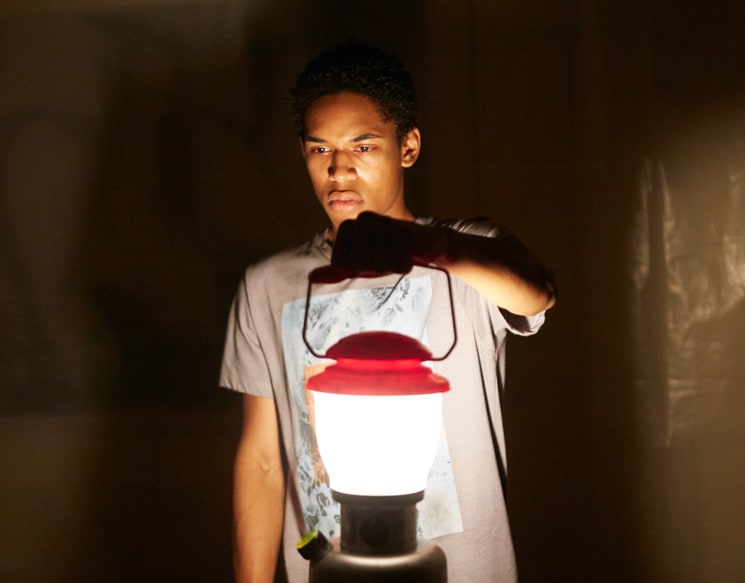Back in 2015, A24 — the critically acclaimed distributor and production company behind such films as Room, The Lobster and Ex Machina — had an unlikely hit on their hands with The Witch, a moody, eerie, unsettling and slowly paced horror that was the talk of the festival circuit. Suddenly, it was cool to make thought-provoking, slow-building psychological horrors again.
So when Trey Edward Shults' sophomore feature had its premiere at the Overlook Film Festival this past April and immediately drew comparisons, it was easy to get excited.
Although It Comes at Night — a desolate and gripping post-apocalyptic horror set in the sticks — doesn't quite live up to lofty expectations, it's certainly a sign of better things to come from the young director. The film stars Joel Edgerton and Carmen Ejogo as a pair of parents named Paul and Sarah, living with their son (Kelvin Harrison Jr.) in a boarded up house somewhere in the American woods. A virus has wiped out most of humanity, leaving only a few left alive.
When Will (Christopher Abbott) breaks into their home one night looking for supplies, claiming to come from a starving family living a few miles away, they're immediately suspicious. Things get even weirder once his wife and young son arrive and their lies start to unravel — and that's not to mention the disappearance and mysterious return of Paul and Sarah's dog, Stanley.
If that last bit seems like an obvious allusion to film great Stanley Kubrick, don't be surprised; although Shults' story about survival in a barren, plagued landscape seems more indebted to Alex Garland's 28 Days Later and Robert Kirkman's The Walking Dead, the straightforward camera angles and pervasive sense of dread and suspicion seem pulled right out of The Shining director's handbook, with slow zoom-ins and claustrophobic, ever-evolving surroundings dotting the film's more sinister scenes.
It doesn't always work. Harrison Jr.'s character, Travis, begins having nightmares once the other family arrives that blend fantasy and reality, and their frequency makes them easy for viewers to predict. It Comes at Night also purposely leaves a lot of questions unanswered, and that starts to get annoying as it nears its end, resulting in some final few scenes that aren't nearly as rewarding as the rest of the film.
But Shults' ability to craft a tense film with limited resources is undeniable. With a bit more time, he too could be mentioned amongst the greats.
(Mongrel Media)So when Trey Edward Shults' sophomore feature had its premiere at the Overlook Film Festival this past April and immediately drew comparisons, it was easy to get excited.
Although It Comes at Night — a desolate and gripping post-apocalyptic horror set in the sticks — doesn't quite live up to lofty expectations, it's certainly a sign of better things to come from the young director. The film stars Joel Edgerton and Carmen Ejogo as a pair of parents named Paul and Sarah, living with their son (Kelvin Harrison Jr.) in a boarded up house somewhere in the American woods. A virus has wiped out most of humanity, leaving only a few left alive.
When Will (Christopher Abbott) breaks into their home one night looking for supplies, claiming to come from a starving family living a few miles away, they're immediately suspicious. Things get even weirder once his wife and young son arrive and their lies start to unravel — and that's not to mention the disappearance and mysterious return of Paul and Sarah's dog, Stanley.
If that last bit seems like an obvious allusion to film great Stanley Kubrick, don't be surprised; although Shults' story about survival in a barren, plagued landscape seems more indebted to Alex Garland's 28 Days Later and Robert Kirkman's The Walking Dead, the straightforward camera angles and pervasive sense of dread and suspicion seem pulled right out of The Shining director's handbook, with slow zoom-ins and claustrophobic, ever-evolving surroundings dotting the film's more sinister scenes.
It doesn't always work. Harrison Jr.'s character, Travis, begins having nightmares once the other family arrives that blend fantasy and reality, and their frequency makes them easy for viewers to predict. It Comes at Night also purposely leaves a lot of questions unanswered, and that starts to get annoying as it nears its end, resulting in some final few scenes that aren't nearly as rewarding as the rest of the film.
But Shults' ability to craft a tense film with limited resources is undeniable. With a bit more time, he too could be mentioned amongst the greats.




